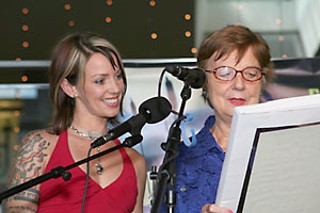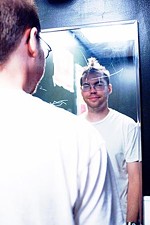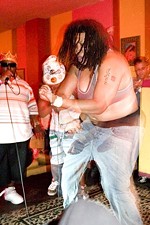TCB
By Christopher Gray, Fri., Sept. 1, 2006

PATRICE WATCH
TCB: How are you doing?
Patrice Pike: I'm really good.
TCB: Have you had a chance to relax since you've been home?
PP: Yeah. It was kind of a crazy the first 48 hours, but I've been home now for six days.
TCB: How glad are you to be home?
PP: I'm really, really glad to be home. I would have loved to stay for another week, maybe two weeks, because I had some really interesting plans.
TCB: Going in, how long did you figure you would last?
PP: Some of the feedback I'd gotten led me to believe that each person chosen in the Top 15 was there for various reasons. For me, it was about my touring history, songwriting credibility – having written a couple of hits – and things where they want to have a diverse group: some people that have zero experience, some people who have tons of experience but may not be as young and new on the market. Whatever, you know. Just a lot of different colors and contrasts on the show.
So ... I auditioned with original songs; other markets they had a list of covers you had to do. I got called and invited to come do it, and they opened up different cities for me to fly to since I was on tour and couldn't be here in Austin. So I auditioned. The first audition was originals, and the next audition you had to do some covers, but they encouraged me to do the original I'd done at the beginning. Then they asked me to do the original for CBS and the band, the management team and stuff. So I kind of knew my role. It was too easy to find out lots of information about me to know that philosophically I didn't really fit the band. They asked me a lot of questions, sometimes in front of other contestants.
I got the feeling, as time passed, and especially when they were kind of sticking it to me, that they were really pushing me. I felt like I started the show off a few times because I was kind of like a pacesetter. You know what I mean? Like in Olympic running when they have someone who's a more experienced runner and they put them out there, and they set the pace. I wanted to push the envelope for what they envisioned for the band – really stretch the possibilities that they were looking at. That was my challenge: to walk in, take the punches, and get as much exposure as I could. I was willing to be in the band if they could actually envision that, so all of that made it a lot of fun for me.
TCB: Do you think the role they imagined for you on the show was like a mentor to some of the younger contestants?
PP: That's the positive side of it. The other side of it – I won't call it negative – is that there's mentorship, and there's also challenging. Putting pressure on people. A lot of people are coming into this thing really confident, really feeling on top of the world because they made the cut, and a part of this whole audition is whether you can take the pressure. Can you deal with not knowing your schedule more than several hours in advance? Can you deal with getting up at 4am to do a taping and then turn around and be up all night on a press schedule, and then all of a sudden they'd say, "Oh, we have a red carpet event." It would be an hour's notice, after we'd been up since 4am. So the test for the next few weeks is going to be who can take the pressure when they start getting into the bottom three.
TCB: How tight of a schedule did they keep you on?
PP: When we did get some downtime we weren't really expecting it, and it was few and far between for sure.
TCB: How much were you able to keep in touch with family and friends?
PP: We had two 15-minute phone calls that were supervised a week. You had to have a short list of calls, and people, that were cleared in advance.
TCB: What was the thinking behind that?
PP: They don't want any of us to know what is happening on the show. They don't want that to influence our behavior. Secondly, they really want your head in it. If you could sit around and talk on the phone all day to your friends, it's not really reality. When you're out on the road doing your thing, granted, you have more contact, but you really have limited contact in terms of your scheduling and stuff. Especially going overseas and things like that. They want to see how people respond to stuff like that.
TCB: Were you disappointed about winding up in the bottom three so often?
PP: I was a little disappointed, but I realized that you could tell from weeks prior that every single person that got in the bottom three were the smaller percentage of people that got negative criticism from the band. And it happened every time, consistently. So they were setting the tone, and they can definitely guide the votes the way they want to, which is great for Supernova because it means that people listen to what they're saying, and they want Supernova to get what they want.
TCB: At the same time, from what I could tell, a couple of times they really seemed to be at a loss when you wound up there. They were really surprised.
PP: Yeah. They were.
TCB: I got the impression they really liked you.
PP: Yeah. I got that impression too, for sure. I still haven't seen the episodes.
TCB: Something else I thought was interesting was once the members of Supernova started playing with y'all, a lot of times people who played with the band members would wind up in the bottom three. Why do think that was?
PP: I really don't know. I think that the band, especially Tommy Lee, was genuinely freaked out by that. Like I said, I don't know how the edits worked. Lots of people who are still there were positioned from early on in terms of how the whole thing ran, comments, and so on and so forth. I definitely was surprised when I was in the bottom three after the Tommy Lee performance. I thought it was fun, edgy, and it wasn't too serious. It was pretty in-your-face, and we had a good time. The whole audience loved it. I've got a hunch that when there was a big huge moment when I was getting my commentary from the audience and Tommy Lee that that probably didn't make the show.
But all in all, I don't have a single complaint about it because only one man or woman will be left standing at the end, and I feel like every situation where the chips were down for me, I came back and had stellar performances with my elimination songs. It's just a win-win situation, because I came off tour in the middle of getting ready to mix my new record – canceled a European tour to go out and do this for the summer – and I'm walking back into a record that's ready to be finished and drop in a couple of months. I've got nothing but tons of positive feedback from all the countries all over the place where this thing's been aired.
TCB: Are there any other contestants on the show you'd consider collaborating with in the future?
PP: I think that Lukas and I have a lot in common in terms of the tendencies we have in our original songwriting. That's one of the things I love to do, is go out and co-write with people, and we got along really well. I want him to win, because I think that, like I said, when I went out there, my intention was to really stretch the obvious of what they could do with the band. I hope he shows his original work and gets a chance to do that in the next couple of weeks because it's pretty amazing, and it hasn't really shone through in the cover performances that he's done.
TCB: What's your honest opinion of Supernova as a band? How much did you get to work with them and see them play?
PP: The closest I got to work with them, in terms of having a space to do it in that wasn't contrived, was in the studio because we would go in and sing original songs that Butch [famous rock producer Walker] had written the lyrics and melody line for or had collaborated with one of the guys on. Also we could go in and sing some of the versions that we wrote – melody and lyrics – and that was where the experience of actually interacting with them really clicked and wasn't like in the middle of a studio on television.
As far as your question about them as a band, I think this has been a really challenging situation for them, to actually get to know each other musically, onstage and on television live. In the end, if they pick the right person and it's someone who's actually going to be able to go the distance with them in all the areas that you have to really be great at when you're a singer – in terms of being the voice, doing the press, convincing the world about the music through your connection with it – if they do that, then they've just gone through this really incredible time of bonding with each other. They've sold 250 million records in their previous projects collectively, and if they can pick the right person who can actually write songs and be charismatic onstage and hold their own with them, they're gonna have a great time, and they'll do well.
TCB: How far afield would they let you go with the song selection? I guess you picked your own songs for the elimination nights.
PP: [Tuesdays] they had a group of songs set out, and you had to negotiate with the other contestants to get what you wanted.
TCB: If you wanted to pick an Arcade Fire song for elimination, would that be OK? As long as they could clear the publishing?
PP: Only if they could clear it, and it was pretty challenging. The elimination songs that I cleared were somewhat obscure. Not to me, or to people I'm in community with, but they're not ultra-mega mainstream hits, except for "Middle of the Road," but that's an old-school hit. So as far as "My Iron Lung" and "Eternal Life," those were pretty risky choices, but I had a feeling the band was really gonna connect with those songs, from an artistic point of view, and just kill.
TCB: I was impressed with the house band. How was it playing with those guys?
PP: Those guys just blew my mind because we would walk in, and they would literally have a couple of hours, two or three hours and a little bit of overnight listening, to learn the whole bunch of songs. At the beginning, they had a lot of stuff down that they knew was going to come up in song selection, but as the weeks passed, it was all new material, and you would walk in and have 30 minutes.
TCB: That's incredible.
PP: Yeah. Equally for the contestants: you walk in and have 30 minutes to do an arrangement, tighten it up, and then it's a go. Like when I did "Celebrity Skin," I had six hours to learn that song and 15 minutes to practice it with the house band the night before elimination.
TCB: Any idea why a Nirvana song came up just about every week?
PP: My guess is there are a lot of things that cleared that just really did not make sense for the show in comparison to other things that made more sense. They were really trying to have some options that were heavier, darker things.
TCB: The flipside of that question is were Metallica, Guns n' Roses, and Mötley Crüe songs off-limits, or did they just never come up?
PP: I don't know if it's legal for me to say what couldn't clear, but of the rock songs that weren't out there – the bands that obviously weren't on the selection – it's definitely a clearing issue. Like Led Zeppelin, AC/DC – those are obvious ones that won't clear. I mean, historically, everybody knows that you can't get a Led Zeppelin song to save your life for a TV show. Which probably would have saved my life a couple of times. If I could have done "Communication Breakdown" or "Kashmir" or something, that would have been awesome.
TCB: Do you feel different now that you've been on the show?
PP: I didn't think that there would ever be anything I would do in my career that would be as big of a challenge and emotionally as difficult as Sister 7 breaking up, but this was like one long three months of intense pressure, just constant pressure to perform and to deal with not having any control other than bringing the best performance you can under really different circumstances. Nobody's ever going to know how it felt for me to be there and to take so much criticism and to know that every week I just got stronger and stronger in terms of 'Bottom three? No problem,' and just crushing it and walking away. I wasn't going to allow people to pull me into drama unless they directly confronted me, and I was going to focus on music, and I was going to use the performance segments as portals to blast through all the reality stuff and make that the most present that I could be so that no matter what was going on on the show I could shine through it. When I got eliminated, I felt like I totally accomplished that.
TCB: What's the first thing you did once you got home and got settled? What was your welcome-back-to-Texas moment?
PP: I went out to a club where like 300 of my friends and fans had planned to show up and welcome me home. And as soon as I landed at the airport I had a margarita.





 Patrice Pike comes home, lalaland breaks out, Trophy's cleans up, and TCB comes clean.
Patrice Pike comes home, lalaland breaks out, Trophy's cleans up, and TCB comes clean.


